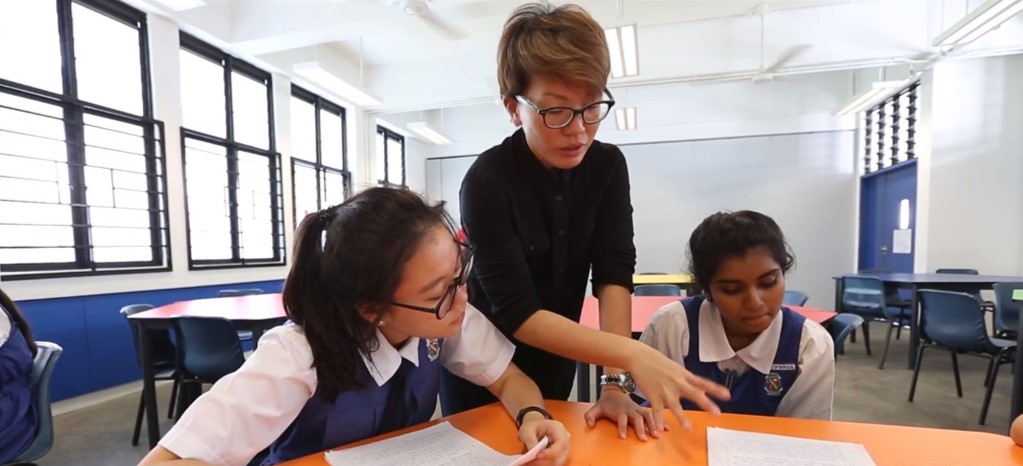The students at Northoaks Primary School catch sight of their Discipline Master from across the foyer. Instantly, they grab their belongings and stand up.
With hastened feet, these students joyfully make their way to Mr Rizal Marof, the school’s Subject Head for Discipline. “’Cher, look at how many stamps I’ve collected!” they announce.
Each stamp represents an instance the student demonstrates a positive behaviour. When they accumulate a certain number, these stamps can be exchanged for a prize.
Curious about the impact of such positive reinforcement efforts on students? Here, three schools – Northoaks Primary, Chung Cheng High (Yishun) and Dunman High School (Senior High) – tell us how this plays out in their school.
Northoaks Primary School: Let’s spin the Wheel of Thrill
Mdm Jorina Ho used to rush her son to get ready for school. “But now Hao Zhe wakes up early on his own and wants to be punctual daily,” she says of her Primary 2 child. “This is all for his chance to accumulate stamps on his game card.”
Northoaks Primary encourages students to practise good habits by completing challenges, called “quests”. All students are given a card containing “quests” such as coming to school on time. Other “quests” require a whole-class effort, such as listening attentively to lessons. For each completed “quest”, students get a stamp on their card, awarded by their teachers.
There are also “Quest Zones” throughout the school. For example, students who follow instructions while waiting in the foyer can receive a stamp from the teacher on duty.

These stamps can be exchanged for a spin at a wheel for prizes from stickers to soft toys – all of which are donated by parents and teachers.

A prefect helping to man the “Wheel of Thrill”. Students can ‘redeem’ a spin by accumulating stamps on their game cards.
Mr Rizal Marof, the school’s Head of Department for Student Management, says the quests were implemented in August 2022 as a way to promote and reinforce good behaviour such as punctuality and responsibility. “After one term, we observed a 30-per-cent decrease in late coming,” he says.
“Teachers also gave feedback that their students practised silent reading every morning, and cleaned up their personal space before dismissal. Most students are motivated to meet the expectations to obtain the stamps and rewards.
“More encouragingly, students keep up with the good behaviour even when there aren’t material benefits. For instance, even when there’s no teacher on duty, there is significantly less noise at the foyer, and students can also be seen reading quietly.”

Teachers can customise the icons on their stamps, which motivates some students to collect different stamp icons.

Mr Rizal at the redemption booth that ‘opens’ every Wednesday for students to exchange their stamps for a prize.
“Students’ desire to earn points or ‘win’ the game encourages desired behaviour like being neat and tidy,” says Mrs Hee Jun-Lynn, the school’s Vice-Principal. “This approach, as opposed to being reactive and punishing students for their bad behaviour, will go a longer way in sustaining and motivating our students to keep doing well.”
What about bad behaviour that persists?
“Depending on the circumstances and the nature of offences, disciplinary consequences such as detention or suspension would still be carried out, as a last resort,” she explains. “These are for serious offences and recalcitrant offenders, to help our students learn the consequences of their inappropriate actions and poor choices.”
Chung Cheng High School (Yishun): ‘I was caught being good’
Chung Cheng High School (Yishun)’s initiative is cleverly titled “I Was Caught Being Good”.
When a teacher “catches” a student doing good beyond what is expected of them, the student is awarded a “ticket”. Good actions may include going out of one’s way to be a helpful buddy, or helping a teacher clean up a classroom.
Instead of a “fine”, at the back of the slip of paper is a note from the teacher on the thoughtfulness of the act. But it doesn’t stop there. The parents and form teachers are informed of this kind deed, together with the school’s Student Management Team.
The students are then affirmed publicly during morning assembly and their good acts publicised on the TV screen outside the General Office.
This initiative gives parents a chance to receive good news too, says Ms Desilu Anne Nair, the school’s Head of Department for Student Management. She adds that it is a nice change for those who are used to receiving bad news.
“For example, we were proud of a student who volunteered to stay back to clean up the D&T room. We informed his mother about the ticket he received, and she was pleasantly surprised. This initiative also helps to strengthen our home-school partnership and foster better ties with our parents.”

Ms Kwok acknowledging Cayden’s effort and thoughtfulness through a handwritten note at the back of the ticket.
Ms Desilu continues, “This new initiative which focuses on positive reinforcement of good behaviour and display of school values, is a refreshing welcome to teachers and students. It helps to create a safe space for students to grow, make mistakes and learn from them.
“Teachers have become more open to affirming good behaviour, rather than just focus on catching and correcting bad behaviour. Students are also encouraged to demonstrate the school values in and out of the classroom, as well as kindness, graciousness and civic-mindedness.”
Dunman High School (Senior High): A weekly Pride and Honour Ceremony
These efforts at positive reinforcement continue at JC-level.
At Dunman High School (Senior High), the entire school participates in the Pride and Honour Ceremony every Friday. During the 30-minute-long ceremony, the school shares and affirms student achievements ranging from sporting to the academic. School leaders also use this opportunity to thank students for the events they have organised.
These may be further publicised on the school’s Instagram. In one instance, a student was commended by a member of the public for administering timely first aid to a stranger.social media post allowed the student to pen his experience and hopefully inspire others with his public-spirited act.
Mr Jason Chen, Head of Department for Character and Citizenship Education, reflects that “these initiatives create a culture of affirmation towards the wider school community” and “ helps to build an environment where students take pride in sharing in the joys and successes of their peers”
“These initiatives go a long way in letting students know that as a school, we cheer one another on through difficult times, and share successes together.”






